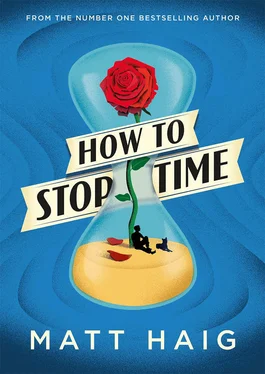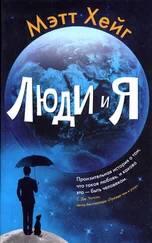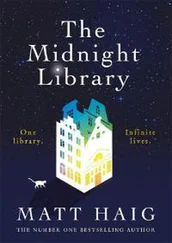Мэтт Хейг - How to Stop Time
Здесь есть возможность читать онлайн «Мэтт Хейг - How to Stop Time» весь текст электронной книги совершенно бесплатно (целиком полную версию без сокращений). В некоторых случаях можно слушать аудио, скачать через торрент в формате fb2 и присутствует краткое содержание. Год выпуска: 2017, Издательство: Canongate Books, Жанр: Современная проза, на английском языке. Описание произведения, (предисловие) а так же отзывы посетителей доступны на портале библиотеки ЛибКат.
- Название:How to Stop Time
- Автор:
- Издательство:Canongate Books
- Жанр:
- Год:2017
- ISBN:нет данных
- Рейтинг книги:4 / 5. Голосов: 2
-
Избранное:Добавить в избранное
- Отзывы:
-
Ваша оценка:
- 80
- 1
- 2
- 3
- 4
- 5
How to Stop Time: краткое содержание, описание и аннотация
Предлагаем к чтению аннотацию, описание, краткое содержание или предисловие (зависит от того, что написал сам автор книги «How to Stop Time»). Если вы не нашли необходимую информацию о книге — напишите в комментариях, мы постараемся отыскать её.
How to Stop Time — читать онлайн бесплатно полную книгу (весь текст) целиком
Ниже представлен текст книги, разбитый по страницам. Система сохранения места последней прочитанной страницы, позволяет с удобством читать онлайн бесплатно книгу «How to Stop Time», без необходимости каждый раз заново искать на чём Вы остановились. Поставьте закладку, и сможете в любой момент перейти на страницу, на которой закончили чтение.
Интервал:
Закладка:
‘I’m short-sighted. Hence the glasses. But I did a test once,’ she says, now adamant. ‘I came out as a “super-recogniser”. It’s a gift I have. The way my temporal lobe is wired. I was in the top one per cent, in terms of visual recognition. Strange brain.’
I want her to stop talking. I want to be invisible. I want to be a normal person with nothing to hide. I look away. ‘That’s wonderful.’
‘When were you last in France?’
‘A long time ago,’ I say, doubting she is old enough to remember me from the 1920s. My bike is free now. ‘See you tomorrow.’
‘I will solve it,’ she says, laughing, as she gets into her little Nissan. ‘I will solve you.’
‘Ha!’ I say. Then, when her car door closes, I say, ‘Shit.’
She beeps me as she passes, giving a fast wave. I wave back and I bike away and I think how easy it would be to just not turn up tomorrow. To talk to Hendrich and disappear again. But there is a part of me – a small but dangerous part – that is keen to know where she knew me from. Or, maybe, a small part that simply wants to be solved.
Later, at home, Hendrich calls.
‘So, how is London?’ he asks.
I am sitting at the little IKEA desk, staring at the Elizabethan penny I have been carrying around for centuries. I normally just keep it in the wallet, in its little sealed polythene bag, but now I have it out on the desk. I stare at the fading coat of arms, and remember Marion’s fist tight around it. ‘It’s fine.’
‘And the job? Are you . . . settling in?’
There is something about his tone that’s annoying. Patronising. The way he said ‘settling in’ in a vaguely amused way. ‘Listen, Hendrich, forgive me, but I have a headache. I know it’s only brunch-time with you, but it’s getting late here and I have to be up early preparing lessons tomorrow. I really would like to go to bed now if that’s—’
‘You’re still getting the headaches?’
‘Sometimes.’
‘They’re par for the course. We all get them towards our middle years. It’s memory pain. You just need to be careful. Modern life doesn’t help. Cut down on your screen time. Our eyes weren’t made for artificial light. No one’s eyes were made for that. It’s all the blue wavelengths. Disturbs our circadian rhythms.’
‘Right. Yes. Exactly. Our circadian rhythms. Anyway, I better go.’
Barely a second later: ‘It could be seen as ungrateful, you know?’
‘What could?’
‘Your recent attitude.’
I place the coin back in the bag and seal it. ‘It’s not an attitude. There’s no attitude.’
‘I’ve been thinking a lot lately.’
‘About what?’
‘The beginning.’
‘The beginning of what?’
‘Of us. When I heard about the doctor. When I telegrammed Agnes. When she came to collect you. When I first met you. Eighteen ninety-one. Tchaikovsky. Harlem. Hot dogs. Champagne. Ragtime. All of that. I made every day your birthday. I still make every day your birthday. Or could do, if you weren’t so obsessed with living the most mundane kind of life on offer. If you could get over your obsession with finding Marion.’
‘She’s my daughter.’
‘And it’s understandable. But look at what you’ve had. Look at the lives I have given you . . .’
I am in the kitchen now. I have the phone on speaker and am getting a glass of water. I drink the water down, taking big, continuous gulps, thinking of my mother, under the water, exhaling her last breath. Then, as Hendrich keeps talking I go and open up my laptop.
‘I’ve basically been your fairy godmother, haven’t I? You were Cinderella, shoeing horses or whatever you were doing, and now look at you. You can have the coach, the glass slippers, whatever you want.’
I log on to Facebook. I have set up a page for myself. It draws more suspicion not having a Facebook page than having one, so Hendrich was okay with the idea (even he, or the retired plastic surgeon he was currently playing, has one).
Obviously, the profile information is fiction. There isn’t even an option to put 1581 as your year of birth, anyway.
‘Are you listening to me?’
‘Yes, Hendrich, I’m listening. I’m listening. You are my fairy godmother.’
‘I’m just worried about you. Really worried, Tom. I’ve been thinking, ever since you came out here, there was something in your eyes. Something that worried me. A kind of yearning.’
I laugh a tired laugh. ‘A yearning?’
And then I notice something.
I have a friend request on Facebook. It is her. Camille Guerin. I accept the request. Then – as Hendrich keeps talking – I find myself looking at her wall.
She updates in a mixture of French and English and emoji. She quotes Maya Angelou and Françoise Sagan and Michelle Obama and JFK and Michel Foucault. She has a friend in France who is raising money for Alzheimer’s and she links to his donation page. She has written a few little poems. I read one called ‘Skyscrapers’ and another called ‘Forest’. I like them. Then, hardly thinking, I click through her photos. I want to find out more about her, and how she might have known me. Maybe she was an alba. Maybe I had met her a long time ago. But no. A quick look through her pictures shows that in 2008, when she joined Facebook, she looked, well, a decade younger. She had looked in her twenties. She was also with a man. Erik Vincent. A frustratingly good-looking man. In one photo he is swimming in a river. In another he is wearing a running vest with a number on it. He is tagged in the pictures. In almost every profile pic up till 2011, and then there is nothing at all until 2014. I wonder what happened to Erik. I look back at the poem ‘Forest’ and realise it is dedicated to him. His profile page is no longer there.
I feel like I am not the only mystery to solve.
‘You can’t lay down an anchor, Tom. You remember the first rule, don’t you, Tom? You remember what I told you, in the Dakota, you remember the first rule?’
In one photo, from 2015, Camille is just staring, sadly, out at the camera. She is out on a pavement café in Paris somewhere, a glass of red wine in front of her. This is the first photo of her in glasses. She is wearing a bright red cardigan, which she is tucking in close around her. A colder evening than she imagined. Her mouth is a smile, but a forced one.
‘The first rule,’ I say wearily, ‘is that you don’t fall in love.’
‘That’s right, Tom. You don’t. It would be a very foolish thing to do.’
‘I don’t mean to be rude but why are you calling? You know it helps, to get into the role.’
‘Of a mayfly?’
‘Yeah.’
He sighs. Makes a little throat-clearing growl sound. ‘I once knew a tightrope walker. A mayfly. He was called Cedar. Like the tree. Strange name. Strange man. Used to work at the funfair on Coney Island. He was very good at tightrope walking. Do you know the way you can tell if a tightrope walker is any good?’
‘How?’
‘They’re still alive.’
He laughs at his own joke before continuing. ‘Anyway, he told me the secret to managing the tightrope. He said people were wrong when they said the secret was to relax and to forget about the drop below you. The secret was the opposite. The secret was never to relax . The secret was never to believe you are good . Never to forget about the drop. Do you understand what I am saying? You can’t be a mayfly, Tom. You can’t just relax. The drop is too big.’
I take the phone into the bathroom and piss quietly against the inside of the toilet bowl, avoiding the water. ‘The drop. Right. I still don’t understand why you are calling me, Hendrich.’
I look in the mirror and I notice something. Something wonderful and exciting, just above my left ear. A grey hair! This is my second. The first one I got in 1979. By 2100 I might have so many they could be noticeable. It gives me a thrill like no other when I notice such a change (hardly ever). I save the flush till later and leave the room, feeling happily mortal.
Читать дальшеИнтервал:
Закладка:
Похожие книги на «How to Stop Time»
Представляем Вашему вниманию похожие книги на «How to Stop Time» списком для выбора. Мы отобрали схожую по названию и смыслу литературу в надежде предоставить читателям больше вариантов отыскать новые, интересные, ещё непрочитанные произведения.
Обсуждение, отзывы о книге «How to Stop Time» и просто собственные мнения читателей. Оставьте ваши комментарии, напишите, что Вы думаете о произведении, его смысле или главных героях. Укажите что конкретно понравилось, а что нет, и почему Вы так считаете.

![Мэтт Хейг - Влюбиться в жизнь [Как научиться жить снова, когда ты почти уничтожен депрессией]](/books/28868/mett-hejg-vlyubitsya-v-zhizn-kak-nauchitsya-zhit-sn-thumb.webp)





![Мэтт Хейг - Полночная библиотека [litres]](/books/388474/mett-hejg-polnochnaya-biblioteka-litres-thumb.webp)

![Мэтт Хейг - Клуб призрачных отцов [litres]](/books/392121/mett-hejg-klub-prizrachnyh-otcov-litres-thumb.webp)

![Мэтт Хейг - Отец Рождество и Я [litres]](/books/421076/mett-hejg-otec-rozhdestvo-i-ya-litres-thumb.webp)
